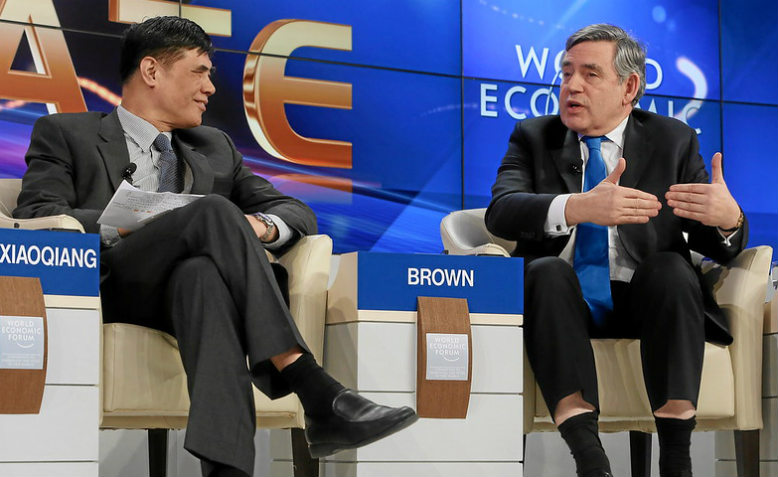 Gordon Brown speaking at the World Economic Forum, January 2013. Photo: World Economic Forum via flickr
Gordon Brown speaking at the World Economic Forum, January 2013. Photo: World Economic Forum via flickr
As per the script, Gordon Brown has made an attempt to stamp his forgettable, but pernicious, brand of neoliberalism onto the current crisis, writes Morgan Daniels
One thing you can be sure of during a crisis is that at some point Gordon Brown will make a boring, grandstanding intervention of no real value whatsoever. Sure as rain, his words will be reported far and wide as ‘statesmanlike’ and an antidote to division.
So it was that Brown appeared on Radio 4’s Today programme this morning to decry the ‘populist nationalism’ affecting country after country as the coronavirus pandemic continues to spread. ‘This is a global problem’, he explained: ‘it’s not just a national problem — it needs global action and not simply national action. We’ve had too much of America first, India first, China first’.
Brown made the case for the protection of jobs, quite reasonably insisting that Boris Johnson needs to tell workers ‘how they are going to be able to survive financially.’ But he also warned that drastic and authoritarian measures will be necessary in the months ahead. ‘I think people have got to accept that at certain points, as we’ve done before, we bring in the Army to help us in certain respects.’
The plaudits have come in thick and fast. ‘Gordon Brown in a different league to most of the leaders and ministers we have heard and seen in recent weeks’ tweeted the irrelevant war criminal Alastair Campbell.
But why should we be listening to Gordon Brown? What can the ideology of ‘sensible’ centrism possibly offer us in the present? What on earth is there to learn from New Labour’s steady mix of privatisation, deregulation, and war — all things, it should be noted, that ensure many more will die from Covid-19 than is necessary?
The appeal to internationalism over populism, in particular, rings hollow from a man who promised to create not just ‘British jobs for British workers’, but a national day of Britishness for the whole country to celebrate the Union Flag, ‘a British symbol of unity around our values’. Such jingoism, of course, was of a piece with the imperialist worldview of the New Labour project. After all, as Tony Blair’s Chancellor, Gordon Brown found the money for five foreign wars in ten years. If you’re that keen to dispatch troops to foreign countries, why not make use of them on home soil, too? In fact, in 2003, the Labour goernment did precisely that: responding to a reported terrorist plot to down an airliner, Tony Blair sent 450 soldiers and some tanks to Heathrow Airport.
New Labour’s ‘internationalism’ was under-girded by a belief that Britain should remain at the top table globally in war and business, and that supranational organisations like NATO and the EU represented the best of global co-operation, means to facilitate the movement of capital and the odd regime change. This worldview has come under considerable strain in recent years. Witness Gordon Brown, shortly after the vote to leave the EU, calling upon the Labour Party to avoid becoming ‘an anti-globalisation party that exploits grievances but offers no answers’. Labour’s task, instead, was to ‘make a currently leaderless globalisation work for the people of Britain.’
Make Britain great again!
This belief in and commitment to transnational capital determined Gordon Brown’s response to the global crash of 2007-8, bailing out UK banks in a deal worth £500 million. In turn unemployment had hit 2.5 million by the end of Brown’s premiership. Unfortunately, then, Brown’s message to the prime minister to project jobs doesn’t feel wholly honest, either—not least because the failures of Labour, magnified by the crash, gave rise to a decade of Tory-led austerity. Every last public ‘intervention’ by Blair or Brown only serves to remind us of the redundancy of their political ideology, no less than its long-term damage.
New Labour is assuredly dead, and for that we should be thankful. The centre is in terminal decline. Where does that leave us?
‘Bourgeois society stands at the crossroads’ wrote the revolutionary Rosa Luxemburg halfway through the First World War, ‘either transition to socialism or regression into barbarism.’ It does not feel melodramatic to suggest that we are confronted with a similarly stark choice in the present. The coronavirus crisis necessitates a new and radically different society. One way forward is the collectivist response, a refashioning of society towards the needs of the majority. More sinister alternatives exist, too, the sort of which would entail plenty of military presence in our towns and cities.
Our revered former Chancellor offered no thoughts this morning on what a fairer and more equal society might look like. But he was up for deploying the Army here and there. Which is it to be, Mr Brown? Socialism or barbarism?

